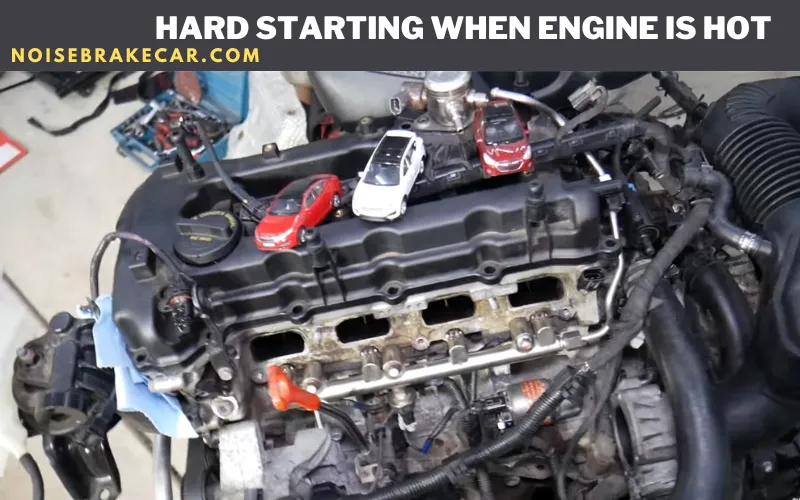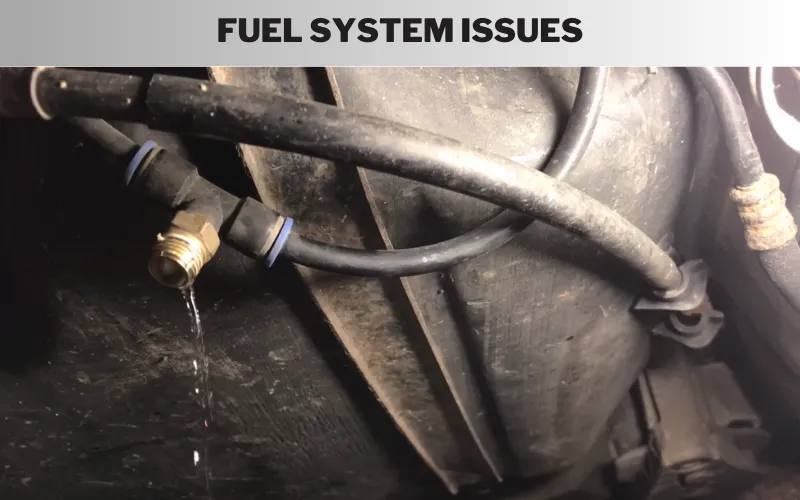It’s not unusual to experience difficulty starting the car in the morning, especially if the battery is dead and the weather is chilly. This reasoning suggests that restarting a warm engine shouldn’t be challenging.
Yes, in most cases, but hard start when engine is hot cause more serious issues. In the article, we read at every scenario in which your car might have trouble starting when it’s hot. Or not start at all.
7 Main Causes Hard Starting When Engine is Hot
- Clogged Air Filter
- Defective Crankshaft or Camshaft Position Sensor
- Vapor Lock
- Bad Engine Ground Connection
- Faulty Battery Connection
- Defective Starter
- Fuel System Issues
1) Clogged Air Filter
One component that is replaced as part of routine maintenance is the air filter. However, a lot of people wait until the filter clogged and full of debris before replacing it. When the air filter is functioning properly, it prevents contaminants, dust, and other particles from entering the motor.

However, as these particles accumulate in the filter, a blockage will eventually result. You will notice decreased engine performance, which will lead to decreased acceleration, misfiring and poor fuel economy, when the proper amount of air cannot enter the combustion chamber.
2) Defective Crankshaft or Camshaft Position Sensor
When the engine heats up, the symptoms of a failing crankshaft and camshaft position sensor may become more apparent. Both of these sensors are in charge of keeping track of each parts rotation and relaying that data to the ECU. The is used by the ECU to control how the spark plugs fire. Intermittent problems are possible if there is a problem or a misunderstanding, especially when the engine is warm.
When that happens, the internal circuitry enlarges and causes more issues. Once it has cooled off, the engine might function normally once more. You might notice addition signs if the position sensor isn’t working properly. This can occasionally result in a blinking check engine light, exhaust backfires and excessive vibrations.
3) Vapor Lock
A vapor lock results if the fuel vaporizes before entering the combustion chamber. This happens when the fuel enters the fuel injection system and begins to boil. The flow to the engine is reduced during this period as the vapor and liquid mix. The likelihood of this condition tends to increase in hot weather.
Additionally, the proximity of the fuel lines to the hot engine increases the likelihood of a vapor lock. In addition to having trouble starting the engine when a vapor lock happens, you’ll also a lack of power and possibly some stalling issues. Try placing a bag of ice on the fuel lines for a few minutes if your car won’t start due to a vapor lock.
4) Bad Engine Ground Connection
For the engine to function as it should, the ground connection is necessary. Circuit resistance may increase if the connection corrodes or becomes loose. This will have an impact on the starting system, as well as other components are acting strangely, or the transmission may be acting up.
You must use a multimeter to conduct a voltage drop test on the engine grounds in order to correct the issue.
5) Faulty Battery Connection
The battery may wiggle in its holder as the car shakes. The battery connections may become loose with time. Corrosion can also happen, further weakening the connection. The issues caused by this disconnect can occasionally be worse when the engine is hot.
You might experience difficulties starting the motor as well as problems with the electrical accessories.
6) Defective Starter
The starter has a motor inside that can degrade over time. When the engine heats up, a failing starter may completely stop functioning. To send current to the windings, the starter motor contains a slip ring commutator and carbon brushes. The motor will have more resistance as the parts deteriorate, which is a problem when the electrical resistance rises.
You might hear a buzzing sound coming from the motor as it breaks down, a loud clicking sound when you try start the engine, or a grinding sound. You should be able to determine whether the starter is malfunctioning with a voltage drop test.
7) Fuel System Issues
There may be a number of fuel system problems that prevent the proper amount of fuel from entering the combustion chamber. It might be a bigger problem, like a leaky fuel injector or the fuel pressure regulator.
Additionally, you shouldn’t rule out the possibility of a defective fuel pressure dampener. Up until the engine is warmed up, everything may appear normal with these parts. The majority of the symptoms appear as soon as the fuel lines warm up.

How to Fix Hard Starting When Engine is Hot?
You should begin looking for the issue as soon as you become aware of any performance issues. Look at the battery connections first after opening the hood. It makes sense to start here because this is one of the easiest to resolve. You can use your code scanner to identify the issue if the Check engine light has turned on.
Additionally, it does not hurt to try a fuel injection cleaner first if you suspect the fuel injectors may be clogged. This affordable substitute is much preferable to having to replace the injectors.